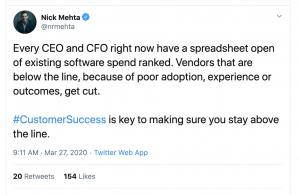 Think back to when your child was young. What’s changed as she’s matured? She’s likely swapped naptime for overtime and a dollhouse for a down payment — and she’s grown into a personality all her own.
Think back to when your child was young. What’s changed as she’s matured? She’s likely swapped naptime for overtime and a dollhouse for a down payment — and she’s grown into a personality all her own.
Like our kids, companies also grow up. Although they may not swap carefree childhoods for adult responsibilities, they still change and mature with time. Growing old with a company is like a relationship: Sometimes, you grow together; other times, you grow apart.
I recently spoke with a friend and mentor, Bruce Eckfeldt, a former Inc. 500 CEO and current entrepreneur, about leaving his former company. Together, we outlined the following five signs that signal that you and your organization have grown apart:
- The passion is gone. Do a quick gut check. Are you still jumping out of bed in the morning ready to take on the day, or is your snooze button getting a daily workout? Is your team energized, or does your office share the excitement level of a meat locker? No one can be fired up about a job 24/7, but if you can’t remember the last time you got excited about work, it might be a sign that your job has outgrown you.
- You constantly feel “the rub.” One surefire sign that your organization is evolving away from you is “the rub” — the friction between you and day-to-day life in your work environment. Too much frustration with co-workers, vendors, or clients can lead to uncomfortable chafing.
- The cylinders aren’t firing like they used to. Do you feel like the behaviors that have always worked for you are no longer hitting the mark? The issue might be turnover, client relationships, or budget, and you can’t shake that feeling of drowning. If the team’s terminology is leaving you behind in meetings or it seems like you have to work twice as hard as you used to just to keep your head above water, you should assess your situation.
- Your company is scaling rapidly. As your company matures, you may find that you can’t (or don’t want to) develop the skills you’ll need to lead in the new environment. If you aren’t willing or able to adapt to the new reality, then you’ll experience more problems as the organization continues to demand things that you can’t provide.
- A disconnection arises between you and the company. If you wrote a job description for the leader of your company, would you apply for the role? Your business will likely begin to value new skills and devalue old ones over time, particularly when moving out of startup mode — where flexibility and innovation take precedence — to become a more mature organization that’s focused on following established processes. You may feel responsible for leading the organization, but are you still connected to its changing needs?
How To Hand Over The Reins
Once you know that your company has evolved away from you, you have an important decision to make: You can either sell your company or hand off your leadership role. This process is all about how you want to be remembered in your company’s collective history.
Do you want to be remembered as the boss who stayed beyond his ability to manage effectively, the executive who stopped showing up one day, or the leader who realized his personal limitations and ensured the organization was left in good hands?
First and foremost, you must decide whether your ego can take admitting that the company has evolved to the point where someone with a different skill set could do a better job. Are you the most qualified for the current needs of the role? Are you willing to adapt your leadership style to your changing business?
If you no longer feel like your leadership is what’s best for the company, pass the torch. Find and integrate the right person to lead the company under your guidance. If you have a good talent planning process in place, you may already have replacement options.
Hopefully, you caught the signs early enough that the performance of the organization hadn’t taken a nosedive. Recognizing the changing currents as they happen helps you be more intentional about identifying a successor and integrating her into the organization in a productive way.
Leading a rapidly growing organization is full of high and low points, and it’s never short on challenges. For Bruce, it was less of an “outgrown” situation and more about growing apart: “Being a founder and operator puts unique pressure on your sense of self and ties up your professional and personal identity in that of the company. For me, I felt like I was fighting to get the organization to go in the direction I wanted to go in personally.”
I, on the other hand, realized fairly early on that in order to be most effective over the long term, I would have to continuously evaluate the needs of my organization and adapt my behaviors. This required me to develop new skills over time and be very intentional about my willingness to change to be of service to my team.
If you’re giving your organization everything you have and still sense that it has evolved beyond you, you owe it to yourself and your company to consider taking action.
This article originally appeared on Forbes.
(198)
Report Post






